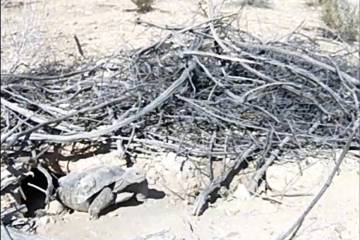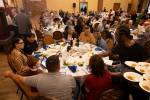Area Jews reflect as Yom Kippur arrives
About a week ago, Amir Eden conducted a simple, but theologically powerful, exercise with students at the Adelson Educational Campus.
Eden, the school's head of Judaic Studies and Jewish Life, gave each student a piece of paper.
Then, he told them to make a note on the paper either asking forgiveness for a harm they did to someone else, or forgiving someone for a harm done to them.
The letters could be written to "someone right in (the) room," Eden added.
Some students did just that, he said. "I know, because I was approached by students who got those messages."
The exercise offered a real-world illustration of the principles of atonement and repentance, both of which are central themes of the Jewish Holy Day of Yom Kippur, which starts at sundown today.
Yom Kippur marks the culmination of the High Holy Days, the 10-day period beginning with Rosh Hashana that is observed as a time of repentance, fasting and putting oneself right with both God and one's fellow man.
The theme of repentance is so central to Yom Kippur that the day often is referred to as the "Day of Atonement." However, said Rabbi Sanford Akselrad of Congregation Ner Tamid, "one of the things people don't realize is that in the daily liturgy in Judaism, there are prayers for repentance. The significance of Yom Kippur, however, is the extreme focus on the subject."
In Judaism, repentance is "related to the concept of return," Akselrad said. "We are returning to God, we are returning to who we truly are, through this process of introspection."
Jewish tradition holds that God inscribes names into the Book of Life at Rosh Hashana and seals it on Yom Kippur, signifying that "there lies a tenuous balance between life and death, and we pray to be written into the Book of Life," Akselrad said.
"That metaphor is really one that gets us in focus of, what if this is your last day on Earth? Is this how we want to leave our relationships? Is this the legacy we want to leave to the world?"
Yom Kippur is observed with prayer and fasting and attendance at synagogue services, even among people who aren't particularly observant of their faith the rest of the year.
"Even people who will be lax will go on Yom Kippur," Akselrad said, to "take a day out and be with their community and reaffirm their sense of faith and commitment that, perhaps, becomes dimmer the rest of the year."
But in a culture of self-absorbed reality show stars, anonymous Internet bullies and celebrities who, despite their lawyer-written apologies, never seem particularly sorry about anything they do, has atonement -- recognizing that one has done wrong, admitting it and then seeking forgiveness for it -- become a tough sell?
"I'm Jewish, and it's been ingrained my entire life to live in a way to ask for forgiveness constantly," said Michele Tell-Woodrow, chief executive officer of Preferred Public Relations.
"That's part of the Jewish way. You're taught as a young Jewish person that there are consequences to your actions from Day One, and to know that there are consequences to your actions hopefully makes you act in a better way from the beginning."
Now, in raising her own children, ages 9 and 5, Tell-Woodrow strives to make them understand that "there is a wrong way and a right way" and that, when they choose the wrong way, repentance must follow.
"You have to recognize that you've fallen short, you recognize you've made a wrong, and you have to make a choice to make that wrong right," she said.
"What I do, for my kids is, every year they write down, 'These are the things I did wrong, these are the things I want to correct next year. I'll be nice to my dad. I'll clean my room.' It's very cute for 5- and 9-year-olds."
Rabbi Shea Harlig of Chabad of Southern Nevada said ego can cause some to have "a hard time grasping" the idea of repentance.
"People think they are right and they cannot see that perhaps 50 percent of the blame is theirs," he said.
"No one wants to be the one to try to make amends. We all make our lines in the sand: 'Let them come back to me, and even then I won't forgive them.' "
Still, Akselrad said, "I don't know if it's a hard sell. Perhaps it's a message that resonates even more powerfully, if we look at the supposed role models and ... people who are celebrities who, perhaps, don't often take responsibility for their actions as they might.
"So whether it's a message that falls more on deaf ears now than decades ago, I can't say. I just think it is a message that is ever-present and ever-needed."
Contact reporter John Przybys at jprzybys@reviewjournal.com or 702-383-0280.





























